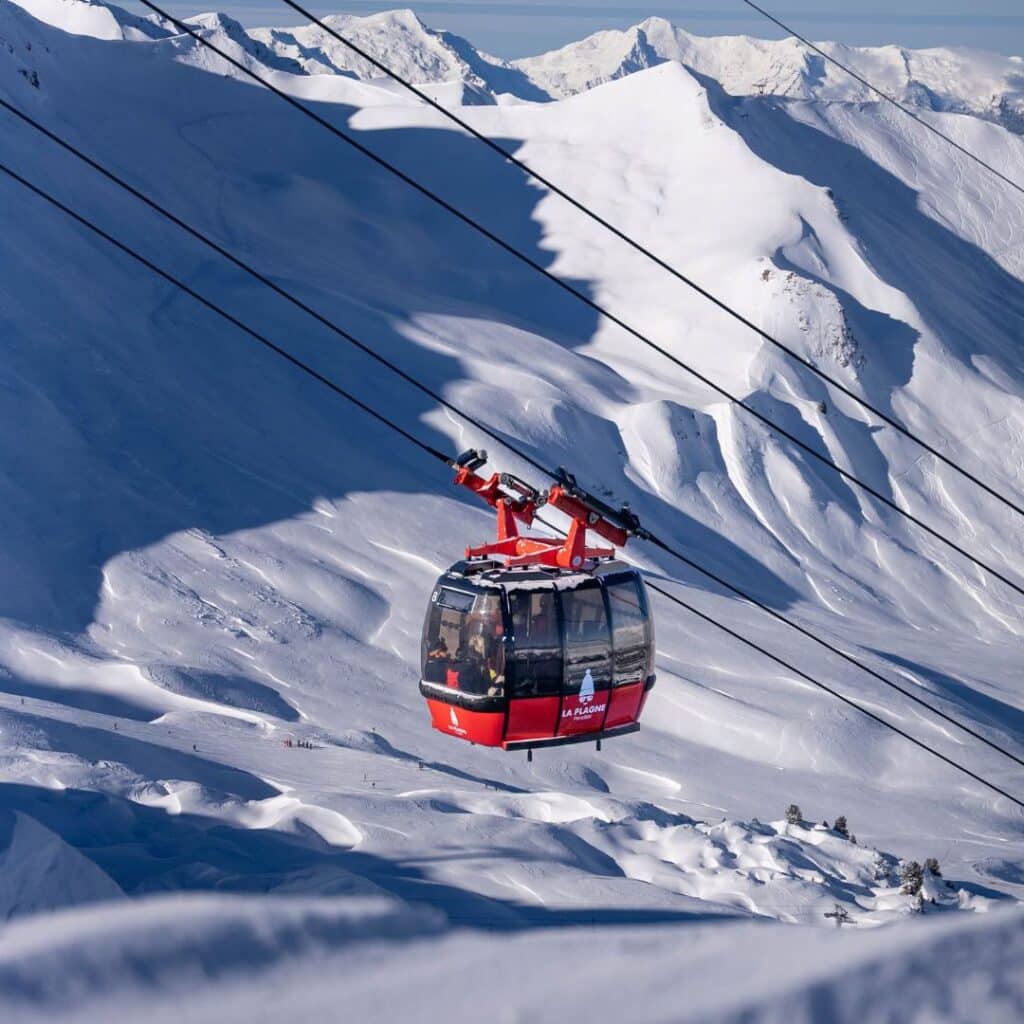That's La Plagne
Do we have a problem with over-tourism in ski resorts?

Join my community newsletter to get regular updates, insider info, and special discounts.
Firstly, what is over-tourism?
Overtourism refers to a situation in which popular tourist destinations, like our European ski resorts, experience an excessive number of visitors beyond what the destination's infrastructure, resources, and local communities can comfortably accommodate. This phenomenon often leads to negative consequences for the destination, its environment, and its residents. Some common characteristics of over-tourism include:
- Crowding: The sheer volume of tourists can overwhelm popular sites, resulting in overcrowded streets, long lines, and limited access to attractions.
- Environmental Impact: Overtourism can harm the natural environment, leading to pollution, habitat destruction, and damage to ecosystems. This is particularly concerning in ecologically sensitive areas.
- Cultural Erosion: Excessive tourism can erode local cultures and traditions as they are commodified for tourists, leading to a loss of authenticity.
- The strain on Infrastructure: Local infrastructure such as roads, public transportation, parking, food and other amenity shopping, sewage systems, and waste management may become strained, affecting the quality of life for residents.
- Housing Issues: Rising property prices and the conversion of residential properties into short-term rentals can contribute to housing shortages and increased living costs for locals.
- Negative Social Impact: Local communities may feel disconnected from their own neighbourhoods, and social tensions can arise between tourists and residents.
- Economic Imbalance: While tourism can bring economic benefits, over-tourism can result in an unequal distribution of these benefits, with local residents often not reaping the rewards.
- Loss of Quality Experience: Overtourism can diminish the quality of the visitor experience, as tourists may not be able to fully enjoy their time due to the overcrowding and commercialization of destinations.
Overtourism is a complex issue that requires careful management and sustainable tourism practices to mitigate its negative impacts. Many destinations actively seek solutions, such as implementing visitor quotas, promoting off-peak travel, and encouraging sustainable tourism practices to balance tourism and the well-being of their communities and natural environments.
Does over-tourism exist in ski resorts?
Yes, over-tourism can also be a concern in ski resorts, particularly in popular and well-known ski destinations. Ski resorts experience many of the same issues associated with over-tourism as other tourist destinations, such as overcrowding, environmental impact, strain on infrastructure, and disruption to local communities.
If you think about the above points and then apply them to our ski resorts, it looks like this:
- Crowding on Slopes: During peak ski seasons, popular ski resorts can become overcrowded, leading to long lift lines, congested slopes, and reduced quality of the skiing experience for visitors. Ironically, those visiting at these peak weeks have also often paid a premium to visit during these weeks.
- Infrastructure Strain: Ski resorts may struggle to accommodate the large number of visitors, leading to congestion on roads, inadequate parking facilities, and overburdened public transportation systems.
- Environmental Impact: Over-tourism in ski resorts can contribute to environmental degradation, including issues like deforestation for new ski runs, increased energy consumption, and waste generation. We only have to look at the European Glaciers and the reduction in summer skiing, or in La Plagne, where we have seen the SAP resort management invest in moving the Glacier Gondola to preserve the Glacier skiing.
- Rising Costs: High demand in popular ski resorts can drive up prices for accommodations, lift tickets, and other services, making it less affordable for many people. In particular, those who live there.
- Impact on Local Communities: In some cases, the influx of tourists can negatively affect the lives of local residents. Housing costs may rise due to short-term rentals, and communities can feel overwhelmed by the seasonal influx of visitors.
How can we fight against over-tourism in our ski resorts?
Fighting against over-tourism when you're travelling to ski resorts involves adopting responsible and sustainable travel practices to minimise your impact on popular destinations. Here are some ways you can help combat over-tourism:
1. Choose Less Popular Destinations
Instead of visiting heavily congested “famous” ski resorts, explore less-visited destinations within a region. This helps distribute tourist income to areas that may benefit from it more. For example, within the La Plagne ski resort where I live, rather than opting to stay in the altitude villages, you could explore the valley villages. Not only will you find them calmer and quieter, but the accommodations are larger – and cheaper!
2. Travel During Off-Peak Weeks
Plan your trips during shoulder or off-peak weeks to reduce the pressure on popular destinations. This can also lead to a more enjoyable and authentic experience. This is difficult when we talk about ski resorts because so many skiers are tied to travelling during their children’s school holidays.
3. Stay Longer
Opt for longer stays in one place rather than rushing through multiple destinations in a short period. This reduces the strain on local infrastructure and fosters a deeper connection with the culture and community. We are seeing more people opt for 2-week ski holidays rather than visiting over 2 separate weeks.
4. Use Public Transportation
Choose public transportation, walking, or cycling over private vehicles to reduce traffic congestion and minimise your carbon footprint. Most ski resorts have excellent public transport options. In La Plagne, we have our free shuttle bus network, or in Avoriaz, the resort is car-free, and you can explore by horse and cart or sleigh ride!
5. Respect Local Cultures
Research and respect local customs, traditions, and etiquette. Avoid disrespectful behaviour, such as dressing inappropriately or engaging in disruptive activities. When we look at ski resorts, this is largely in relation to après ski activities. We are starting to see local authorities clamping down on excessive noise at night, not only due to the disruption it causes to people on holiday or living in the area but also looking at how it impacts the local wildlife.
6. Support Sustainable Accommodations
Stay in eco-friendly and locally-owned accommodations that prioritise sustainable practices, such as reducing energy and water consumption and supporting the local economy. I would rather stay in a ski company chalet or ski hotel and receive a consistent level of service than an apartment via Airbnb that someone has bought as a second home to rent out throughout the ski season and, as such, blocked off that accommodation to the local community.
7. Reduce Plastic Use: Minimise single-use plastics by carrying a reusable water bottle, shopping bag, and utensils. Dispose of waste properly and participate in beach cleanups or other community efforts if available.
8. Consume Local Products
Support local businesses and artisans by purchasing locally-made souvenirs and dining at locally-owned restaurants. Avoid international chain establishments. You can have a look at my local gift guide here.
9. Respect Nature
Follow Leave No Trace principles when exploring natural areas, including parks and wilderness. Stay on marked trails, don’t head off-piste and put yourself or others in danger, avoid disturbing wildlife, and pack out all trash.
10. Participate in Responsible Tours
Choose tour operators and activities that prioritise sustainable and responsible tourism practices. Verify that they adhere to ethical and environmental standards. A few ski tour operators that are championing sustainable practices are Inghams, AliKats in Morzine, and Alpoholics in La Plagne.
11. Advocate for Sustainable Tourism
Educate fellow travellers about responsible tourism practices and encourage them to make responsible choices as well.
12. Stay Informed
Stay informed about local regulations and guidelines for tourists. Be aware of any visitor quotas, conservation efforts, or community initiatives in place. Whilst we haven’t seen this yet in Europe, there are some American ski resorts that are limiting the number of active lift passes per day/week on their mountains. It will be interesting to see if this filters through to our European ski resorts.
That’s La Plagne and how to fight over-tourism in ski resorts
By practising responsible and sustainable tourism, when you head skiing this winter, you can contribute to the preservation of the ski resorts you visit and help combat the negative effects of over-tourism while having a magical ski holiday with your family.




